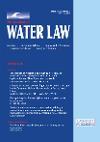Journal of Water Law - Volume 27 - Issue 1

ARTICLES
The impact of riparian and other public rights in Scotland on the delivery of ‘run of the river’ hydro schemes: Time for a new approach
CRISPIN AGNEW QC Hon Research Fellow, Dundee Law School, University of Dundee
SARAH HENDRY Head of Law, Dundee Law School, University of Dundee
This article considers the impediments to the development of small run of the river hydro schemes (RR hydro schemes). We consider the impact, if any, of the modern statutory rules on water rights and water uses, under the Water Environment and Water Services (Scotland) Act 2003 (WEWS) and its associated regulations alongside the potential impact on RR hydro schemes of the rights of other users of rivers. Finally, the authors also examine the crofters’ rights in crofts and common grazings under the Crofters (Scotland) Act 1993.
Charges for water services: legal and systemic concepts in the European Union (the example of Poland) and China
MARCIN SOBOTA University of Environmental and Life Sciences, Landscape Architecture Department, Wrocław, Poland
LI FENG Central South University Law School, PR China
BARTOSZ JAWECKI University of Environmental and Life Sciences, Landscape Architecture Department, Wrocław, Poland
This article analyses the legal provisions related to water law, especially those connected with charges for water services and their location in the European Union’s legal system (‘the EU’) (using the example of Poland) and in the legal system applicable in China. The authors cite the legal provisions reflected in the policy relating to environmental protection in the international organization that is the European Union. The main objective of this article is making comparisons of accepted solutions – as elements of the legal system. Authors do not evaluate them, just show that they are a good reason for further discussion. In the opinion of authors it is crucial to discover and learn about different kinds of legal systems in the first place.
Recognising the human right to water: a goal yet to be achieved
ELENA QUADRI Research Associate, Water Resources Research and Documentation Centre (WARREDOC), University for Foreigners of Perugia (Italy)
This article carries an analysis of the main international legal instruments that have been adopted in the last decades regarding the human right to water. The focus is, in particular, on the main international conferences and conventions, on the UN General Assembly resolutions and on the available case law from the European Court of Human Rights and the InterAmerican Court of Human Rights. The slow emergence of a human right to water is borne out of the instruments under review and, in particular, of soft law instruments that are not legally binding, notably, General Comment No. 15. This, in particular, provides the most explicit re-statement of the emerging human right to water in international law. The recognition of this fundamental right remains a goal to be achieved, and a universal compact crystallizing such right is highly desirable.
Trade incentives in water conservation: adding a market-based mechanism to transboundary water management systems and international water treaties
SARA MARRON The George Washington University Law School
This article will argue that transboundary water management and principles of international trade can be closely intertwined as a sustainable solution to water scarcity. There have been disputes over how to classify water in treaty and trade agreements, as its fragility in our ageing infrastructures becomes more apparent. Parties to international treaties struggle to define at what point water goes from being a natural resource to a product in trade subject to tariffs and international law. Is water a human right, or is it a commodity? If it is the latter, how do trade laws affect its transfer between nations and states under international law? What tariffs apply, and how do we ensure fairness in trade with a resource so precious.
CASE COMMENTARY
The Turag River case: declaring the rivers in Bangladesh as legal persons
ISHRAT JAHAN Bangladesh Judicial Service
